| ||||||||||||||||||||||
All 6 South Carolina seats to the United States House of Representatives | ||||||||||||||||||||||
|---|---|---|---|---|---|---|---|---|---|---|---|---|---|---|---|---|---|---|---|---|---|---|
| ||||||||||||||||||||||
 
| ||||||||||||||||||||||
| Elections in South Carolina |
|---|
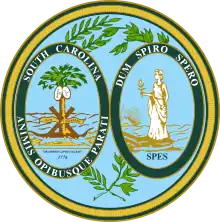 |
The 1992 United States House of Representatives elections in South Carolina were held on November 3, 1992, to elect the six U.S. representatives from the state of South Carolina, one from each of the state's six congressional districts. The elections coincided with the 1992 U.S. presidential election, as well as other elections to the House of Representatives, elections to the United States Senate and various state and local elections.
Primary elections were held on August 25. In the general election, four incumbents were re-elected; however, incumbent Democrat Liz J. Patterson of the 4th district was defeated in her bid for a fourth term by Republican challenger Bob Inglis. Additionally, control of the open 6th district seat was retained by Democratic newcomer Jim Clyburn following the retirement of five-term incumbent Robin Tallon after the district's racial composition was significantly altered in redistricting. As of 2023, this is the last time South Carolina's congressional delegation comprised an equal number of Republicans and Democrats, and the last time Democrats would receive over 40% of the vote in U.S. House elections in the state until 2006.
Redistricting
Following the 1990 United States census and subsequent redistricting cycle, South Carolina's congressional districts were redrawn by a federal court after the state legislature failed to produce their own map.[1] The court's plan, which was issued on May 1, 1992,[2] shifted the boundaries of each of the state's six congressional districts substantially; in the 1980s, South Carolina's districts were largely made up of whole counties, with only one (Berkeley County) being split between two districts. In contrast, the court-drawn lines split a total of 13 counties, 11 of which were divided and dispersed to create the new 1st, 2nd, 5th, and 6th districts. This splitting of counties was done largely to shift the 6th district, then-consisting of a predominantly white electorate, into a majority-minority seat that would allow the state's large black population to elect an African American to Congress.[1]
Overview
| District | Republican | Democratic | Others | Total | Result[3] | ||||
|---|---|---|---|---|---|---|---|---|---|
| Votes | % | Votes | % | Votes | % | Votes | % | ||
| District 1 | 121,938 | 66.07% | 59,908 | 32.46% | 2,703 | 1.46% | 184,549 | 100.0% | Republican Hold |
| District 2 | 148,667 | 87.62% | 0 | 0.00% | 21,003 | 12.38% | 169,670 | 100.0% | Republican Hold |
| District 3 | 75,660 | 38.83% | 119,119 | 61.13% | 85 | 0.04% | 194,864 | 100.0% | Democratic Hold |
| District 4 | 99,879 | 50.34% | 94,182 | 47.47% | 4,349 | 2.19% | 198,410 | 100.0% | Republican Gain |
| District 5 | 70,866 | 38.71% | 112,031 | 61.19% | 189 | 0.10% | 183,086 | 100.0% | Democratic Hold |
| District 6 | 64,149 | 34.70% | 120,647 | 65.26% | 75 | 0.04% | 184,871 | 100.0% | Democratic Hold |
| Total | 581,159 | 52.10% | 505,887 | 45.35% | 28,404 | 2.55% | 1,115,450 | 100.0% | |
District 1
| |||||||||||||||||
 County results Ravenel: 50–60% 70–80% Oberst: 50–60% | |||||||||||||||||
| |||||||||||||||||
The 1st district stretches from the coastal regions of the Pee Dee into the upper parts of the Lowcountry, including all of Georgetown and Horry counties, and taking in a sizable portion of Berkeley County; due to redistricting, the 1st lost a significant amount of its share of Charleston and Dorchester counties, in addition to all of Beaufort, Colleton, Hampton, and Jasper counties.[1] The incumbent was Republican Arthur Ravenel Jr., who was re-elected with 65.5% of the vote in 1990.
Republican primary
Candidates
Nominee
- Arthur Ravenel Jr., incumbent U.S. representative[4]
Democratic primary
Candidates
Nominee
- Bill Oberst Jr., former Georgetown Chamber of Commerce executive director[4]
General election
Endorsements
- Federal officials
- Paul Tsongas, former U.S. senator from Massachusetts (1979–1985)[5]
- Organizations
- Charleston Trident Association of Realtors[5]
Fundraising
| Campaign finance reports as of December 31, 1992 | |||
|---|---|---|---|
| Candidate (party) | Total receipts | Total disbursements | Cash on hand |
| Arthur Ravenel Jr. (R) | $282,816 | $561,793 | $0 |
| Bill Oberst Jr. (D) | $56,972 | $56,902 | $69 |
| Source: Federal Election Commission[6] | |||
Results
| Party | Candidate | Votes | % | |
|---|---|---|---|---|
| Republican | Arthur Ravenel Jr. (incumbent) | 121,938 | 66.07 | |
| Democratic | Bill Oberst Jr. | 59,908 | 32.46 | |
| American | John R. Peeples | 2,608 | 1.41 | |
| Write-in | 95 | 0.05 | ||
| Total votes | 184,549 | 100.0 | ||
| Republican hold | ||||
District 2
| |||||||||||||||||
| |||||||||||||||||
The 2nd district extends from the Midlands down to the Lowcountry, taking in all of Allendale, Barnwell, Hampton, Jasper, and Lexington counties, as well as parts of Aiken, Beaufort, Calhoun, Colleton, Orangeburg, and Richland counties; redistricting shifted the 2nd from a Midlands-centric seat into one which stretches along South Carolina's border with Georgia and includes a relatively large portion of the state's coastline.[1] The incumbent was Republican Floyd Spence, who was re-elected with 88.9% of the vote in 1990.
Republican primary
Candidates
Nominee
- Floyd Spence, incumbent U.S. representative[4]
General election
Endorsements
- Individuals
- Jack Gargan, founder of Throw the Hypocritical Rascals Out[7]
- Organizations
- The Coalition to End the Permanent Congress[7]
Fundraising
| Campaign finance reports as of December 31, 1992 | |||
|---|---|---|---|
| Candidate (party) | Total receipts | Total disbursements | Cash on hand |
| Floyd Spence (R) | $169,036 | $179,539 | $51,688 |
| Source: Federal Election Commission[8] | |||
Results
| Party | Candidate | Votes | % | |
|---|---|---|---|---|
| Republican | Floyd Spence (incumbent) | 148,667 | 87.62 | |
| Libertarian | Geb Sommer | 20,816 | 12.27 | |
| Write-in | 187 | 0.11 | ||
| Total votes | 169,670 | 100.0 | ||
| Republican hold | ||||
District 3
| |||||||||||||||||
 County results Derrick: 50–60% 60–70% 70–80% | |||||||||||||||||
| |||||||||||||||||
The 3rd district is based in both the Upstate and Midlands, encompassing all of Abbeville, Anderson, Edgefield, Greenwood, McCormick, Oconee, Pickens, and Saluda counties, and parts of Aiken and Laurens counties; following redistricting, the 3rd became much more Upstate-oriented as it lost Allendale and Barnwell counties, as well as some of Aiken County, while gaining most of Laurens County.[1] The incumbent was Democrat Butler Derrick, who was re-elected with 62.1% of the vote of in 1990.
Democratic primary
Candidates
Nominee
- Butler Derrick, incumbent U.S. representative[4]
Republican primary
Candidates
Nominee
- Jim Bland, Aiken County councilman[4]
General election
Fundraising
| Campaign finance reports as of December 31, 1992 | |||
|---|---|---|---|
| Candidate (party) | Total receipts | Total disbursements | Cash on hand |
| Butler Derrick (D) | $681,632 | $673,677 | $114,145 |
| Jim Bland (R) | $17,536 | $17,339 | $194 |
| Source: Federal Election Commission[9] | |||
Results
| Party | Candidate | Votes | % | |
|---|---|---|---|---|
| Democratic | Butler Derrick (incumbent) | 119,119 | 61.13 | |
| Republican | Jim Bland | 75,660 | 38.83 | |
| Write-in | 85 | 0.04 | ||
| Total votes | 194,864 | 100.0 | ||
| Democratic hold | ||||
District 4
| |||||||||||||||||
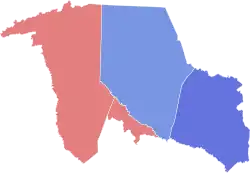 County results Inglis: 50–60% Patterson: 50–60% 60–70% | |||||||||||||||||
| |||||||||||||||||
The 4th District is located solely in the Upstate and includes all of Greenville, Spartanburg, and Union counties; additionally, the 4th gained parts of Laurens County in redistricting.[1] The incumbent was Democrat Liz J. Patterson, who was re-elected with 61.4% of the vote in 1990.
Democratic primary
Candidates
Nominee
- Liz J. Patterson, incumbent U.S. representative[4]
Republican primary
Candidates
Nominee
- Bob Inglis, lawyer[10]
Eliminated in primary
Primary results
| Party | Candidate | Votes | % | |
|---|---|---|---|---|
| Republican | Bob Inglis | 21,301 | 70.79 | |
| Republican | Bill McCuen | 4,760 | 15.82 | |
| Republican | Jerry L. Fowler | 4,029 | 13.39 | |
| Total votes | 30,090 | 100.0 | ||
General election
Fundraising
| Campaign finance reports as of December 31, 1992 | |||
|---|---|---|---|
| Candidate (party) | Total receipts | Total disbursements | Cash on hand |
| Bob Inglis (R) | $226,577 | $215,364 | $11,214 |
| Liz J. Patterson (D) | $409,337 | $406,015 | $6,052 |
| Jo Jorgensen (L) | $9,301 | $9,300 | $0 |
| Source: Federal Election Commission[11] | |||
Results
| Party | Candidate | Votes | % | |
|---|---|---|---|---|
| Republican | Bob Inglis | 99,879 | 50.34 | |
| Democratic | Liz J. Patterson (incumbent) | 94,182 | 47.47 | |
| Libertarian | Jo Jorgensen | 4,286 | 2.16 | |
| Write-in | 63 | 0.03 | ||
| Total votes | 198,410 | 100.0 | ||
| Republican gain from Democratic | ||||
District 5
| |||||||||||||||||
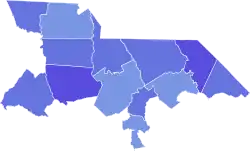 County results Spratt: 50–60% 60–70% 70–80% | |||||||||||||||||
| |||||||||||||||||
The 5th district comprises portions of the Upstate, Midlands, and Pee Dee, including all of Cherokee, Chester, Chesterfield, Dillon, Fairfield, Kershaw, Lancaster, Marlboro, Newberry, and York counties, along with parts of Darlington, Lee, and Sumter counties; the 5th was shifted away from the Upstate and towards the Pee Dee during redistricting and resulting lost Laurens County. The incumbent was Democrat John Spratt, who was re-elected unopposed in 1990.
Democratic primary
Candidates
Nominee
- John Spratt, incumbent U.S. representative[4]
Republican primary
Candidates
Nominee
- Bill Horne, businessman and former aide to Governor Richard Riley[4]
Eliminated in primary
- Earnest Archer, Winthrop University professor[12]
Primary results
| Party | Candidate | Votes | % | |
|---|---|---|---|---|
| Republican | Bill Horne | 7,258 | 55.44 | |
| Republican | Earnest Archer | 5,833 | 44.56 | |
| Total votes | 13,091 | 100.0 | ||
General election
Fundraising
| Campaign finance reports as of December 31, 1992 | |||
|---|---|---|---|
| Candidate (party) | Total receipts | Total disbursements | Cash on hand |
| John Spratt (D) | $281,855 | $381,942 | $52,937 |
| Bill Horne (R) | $102,751 | $102,728 | $22 |
| Source: Federal Election Commission[13] | |||
Results
| Party | Candidate | Votes | % | |
|---|---|---|---|---|
| Democratic | John Spratt (incumbent) | 112,031 | 61.19 | |
| Republican | Bill Horne | 70,866 | 38.71 | |
| Write-in | 189 | 0.10 | ||
| Total votes | 183,086 | 100.0 | ||
| Democratic hold | ||||
District 6
| |||||||||||||||||
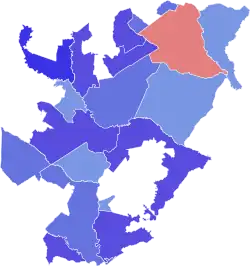 County results Clyburn: 50–60% 60–70% 70–80% 80–90% Chase: 50–60% | |||||||||||||||||
| |||||||||||||||||
The 6th district is centrally located and largely made up of split counties from the Pee Dee, Midlands, and Lowcountry; incorporating parts of Beaufort, Berkeley, Calhoun, Charleston, Colleton, Darlington, Dorchester, Lee, Orangeburg, Richland, and Sumter counties, it also includes all of Bamberg, Clarendon, Florence, Marion, and Williamsburg counties. During redistricting, there was bipartisan support from Republicans and black Democrats to transform the 6th into a majority-minority seat.[1] The incumbent was Democrat Robin Tallon, who was re-elected unopposed in 1990.
Democratic primary
Candidates
Nominee
- Jim Clyburn, former state human affairs commissioner[4]
Eliminated in primary
- Herbert Fielding, state senator[14]
- Frank Gilbert, state senator[14]
- John Roy Harper II, civil rights activist[14]
- Ken Mosely, South Carolina State University professor[14]
Withdrawn
- Robin Tallon, incumbent U.S. representative[15]
Primary results
| Party | Candidate | Votes | % | |
|---|---|---|---|---|
| Democratic | Jim Clyburn | 41,415 | 56.11 | |
| Democratic | Frank Gilbert | 11,089 | 15.02 | |
| Democratic | Ken Mosely | 9,494 | 12.86 | |
| Democratic | Herbert Fielding | 9,130 | 12.37 | |
| Democratic | John Roy Harper II | 2,680 | 3.63 | |
| Total votes | 73,808 | 100.0 | ||
Republican primary
Candidates
Nominee
Eliminated in primary
- Delores DaCosta, former congressional aide[14]
- Toney Graham, member of the state Department of Health and Environmental Control board[14]
Primary results
| Party | Candidate | Votes | % | |
|---|---|---|---|---|
| Republican | John Chase | 5,507 | 57.14 | |
| Republican | Delores DaCosta | 2,452 | 25.44 | |
| Republican | Toney Graham | 1,678 | 17.41 | |
| Total votes | 9,637 | 100.0 | ||
General election
Endorsements
- Federal officials
- Robin Tallon, U.S. representative for South Carolina's 6th congressional district (1983–1993)[16]
- State officials
- T. Eston Marchant, South Carolina adjutant general (1979–1995)[16]
- Thomas T. Medlock, attorney general of South Carolina (1983–1995)[16]
- Earle Morris Jr., South Carolina comptroller general (1976–1999)[16]
- Grady Patterson, South Carolina treasurer (1967–1995, 1999–2007)[16]
- Nick Theodore, lieutenant governor of South Carolina (1987–1995)[16]
- State officials
- Frank Gilbert, state senator[17]
Fundraising
| Campaign finance reports as of December 31, 1992 | |||
|---|---|---|---|
| Candidate (party) | Total receipts | Total disbursements | Cash on hand |
| Jim Clyburn (D) | $422,978 | $422,229 | $795 |
| John Chase (R) | $115,338 | $114,289 | $1,048 |
| Source: Federal Election Commission[18] | |||
Results
| Party | Candidate | Votes | % | |
|---|---|---|---|---|
| Democratic | Jim Clyburn | 120,647 | 65.26 | |
| Republican | John Chase | 64,149 | 34.70 | |
| Write-in | 75 | 0.04 | ||
| Total votes | 184,871 | 100.0 | ||
| Democratic hold | ||||
See also
References
- 1 2 3 4 5 6 7 Cirincion, Carmen (February 2000). "Assessing South Carolina's 1990s congressional districting". Political Geography. 19 (2): 189–211. doi:10.1016/S0962-6298(99)00047-5. Retrieved May 5, 2023.
- ↑ Webster, Gerald R. (May 1995). "Congressional Redistricting in the Southeastern U.S. in the 1990s". Southeastern Geographer. 35 (1): 1–21. doi:10.1353/sgo.1995.0006. JSTOR 44370946. S2CID 129913516. Retrieved May 5, 2023.
- 1 2 3 4 5 6 7 8 9 10 11 South Carolina Election Commission Annual Report (PDF) (20th ed.). Columbia, South Carolina: South Carolina Election Commission. June 30, 1993. pp. 51–52, 65–66, 81–83. Retrieved May 5, 2023.
- 1 2 3 4 5 6 7 8 9 10 Cooper, Brad; Gerber, Jill (October 25, 1992). "Derrick, Bland square off in 3rd District; 4th District race offers voters some distinct choices; Other congressional races in state". The Greenville News. Retrieved November 10, 2023 – via Newspapers.com.

- 1 2 "Tsongas backs Oberst in race for 1st District". The State. October 6, 1992. Retrieved November 19, 2023 – via Newspapers.com.

- ↑ "1992 Election United States House - South Carolina - District 01". Federal Election Commission. December 31, 1992. Retrieved May 5, 2023.
- 1 2 The Associated Press (October 6, 1992). "Group endorses Spence challenger". The Greenville News. Retrieved November 19, 2023 – via Newspapers.com.

- ↑ "1992 Election United States House - South Carolina - District 02". Federal Election Commission. December 31, 1992. Retrieved May 17, 2023.
- ↑ "1992 Election United States House - South Carolina - District 03". Federal Election Commission. December 31, 1992. Retrieved May 18, 2023.
- 1 2 3 Fleischer, Jo (March 26, 1992). "Republican candidates schedule debates". The Greenville News. Retrieved November 10, 2023 – via Newspapers.com.

- ↑ "1992 Election United States House - South Carolina - District 04". Federal Election Commission. December 31, 1992. Retrieved November 10, 2023.
- ↑ Fretwell, Sammy (August 26, 1992). "Inglis, Horne capitalize on voter frustration". The State. Retrieved November 11, 2023 – via Newspapers.com.

- ↑ "1992 Election United States House - South Carolina - District 05". Federal Election Commission. December 31, 1992. Retrieved November 11, 2023.
- 1 2 3 4 5 6 Koziatek, Mike; Bodman, Matthew (August 26, 1992). "Inglis wins easily, will face Patterson in November vote". The Greenville News. p. 6A. Retrieved November 17, 2023 – via Newspapers.com.

- ↑ The Associated Press (June 28, 1992). "The 1992 campaign: On the trail; white incumbent quits race in black-majority district". The New York Times. Retrieved November 17, 2023.
- 1 2 3 4 5 6 The Associated Press (October 21, 1992). "State leaders endorse Clyburn". The Index-Journal. Retrieved November 19, 2023 – via Newspapers.com.

- ↑ Bandy, Lee (October 18, 1992). "Voters divided by race". The State. p. 2B. Retrieved November 19, 2023 – via Newspapers.com.

- ↑ "1992 Election United States House - South Carolina - District 06". Federal Election Commission. December 31, 1992. Retrieved November 17, 2023.




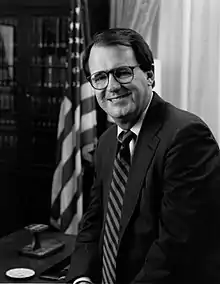
.jpg.webp)
.jpg.webp)
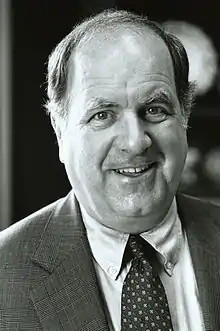
.png.webp)